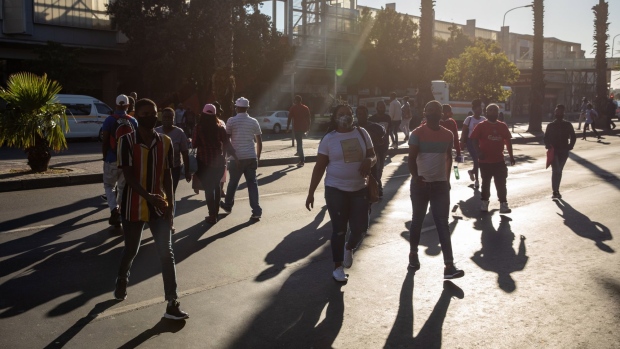Nov 30, 2021
South Africa’s Jobless Rate Rises to New High in Third Quarter
, Bloomberg News

(Bloomberg) --
South Africa’s unemployment rate climbed to a new high in the third quarter as all sectors other than finance shed jobs.
The jobless rate rose to 34.9%, from 34.4% in the three months through June, Statistics South Africa said Tuesday in a report released in the capital, Pretoria. That’s the highest on a global list of 82 countries monitored by Bloomberg -- although the data from some of those nations is outdated. The median of 23 economists’ estimates in a Bloomberg survey was 34%.
Unemployment according to the expanded definition, which includes people who were available for work but not looking for a job, rose to 46.6% from 44.4% in the second quarter.
Industries that shed the most jobs included trade, community and social services. The job losses were in part due to stricter lockdown measures to curb the spread of a third wave of Covid-19 infections, a security breach at the state-owned port operator that hobbled trade and deadly riots in KwaZulu-Natal and the commercial hub of Gauteng -- the two biggest provinces by contribution to gross domestic product.
The July riots saw thousands of businesses ransacked and shuttered and cost the country about 50 billion rand ($3.1 billion) in lost output, according to the South African Property Owners Association. They also probably contributed to an economic contraction in the third quarter that’s being forecast by the Finance Ministry and central bank.
A three-week steel and engineering industry strike, the resumption of rolling blackouts and the emergence of a new coronavirus variant that prompted several nations to ban travel to and from the country right before its summer holiday season, are set to crimp growth in the fourth quarter. That would further derail South Africa’s recovery from its worst contraction in almost three decades and lead to more job losses in the final quarter.
Increased unemployment could put pressure on authorities to extend relief measures that would complicate efforts to restrain public spending and meet its fiscal targets. It could also see the state expanding its job initiatives. The nation set aside 11 billion rand in its 2021 budget to support the creation of more than 440,000 short-term jobs until March.
The jobless rate in Africa’s most-industrialized economy has exceeded 20% for at least two decades, even though output expanded by 5% or more a year in the early 2000s. The International Monetary Fund projects the rate to reach 38.6% in 2026. That is likely to have negative repercussions for the world’s most unequal society.
Strict labor laws and a skills shortage, reduce the ability of South African companies to hire new workers. The apartheid-era strategy of placing so-called townships, where many Black citizens were compelled to live, on the outskirts of cities also makes it difficult for residents to access the formal labor market.
Key Figures:
- Finance industry added 138,000 jobs
- Community, social services lost 210,000 jobs
- Trade industry lost 309,000 jobs
- Mining lost 54,000 jobs
- Construction lost 65,000 jobs
- Agriculture lost 32,000 jobs
©2021 Bloomberg L.P.